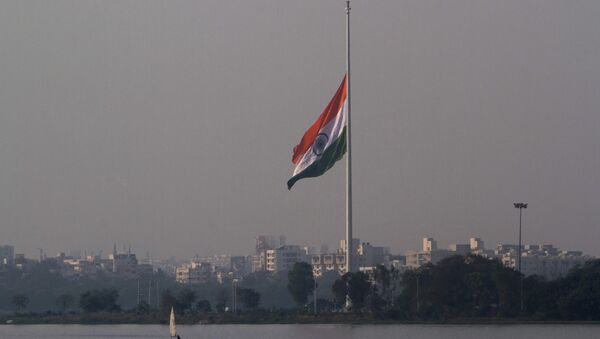New Delhi (Sputnik): Indians today stepped into the centenary year of the Jallianwala Bagh Massacre with a grim reminder of the "ugly face of British imperialism," as the nation led by Indian Prime Minister Narendra Modi paid tribute to the unsung martyrs killed in the episode.
Tributes to the brave martyrs of the Jallianwala Bagh massacre. The indomitable spirit of the martyrs will always be remembered. They sacrificed their lives for our freedom.
— Narendra Modi (@narendramodi) April 13, 2018
The incident was referred as "an extraordinary event, a monstrous event, an event which stands in singular and sinister isolation," by none other than Prime Minister Winston Churchill himself in his speech in the House of Commons in the UK on July 8, 1920. Churchill was then the UK secretary of state for war.
99 years ago today the Jallianwala Bagh massacre was carried out in India. More than 1000 people were murdered as British forces fired on a crowd for over ten minutes. Colonel Dyer who ordered the massacre was lauded as a hero in Britain & received the equivalent of £1 million. pic.twitter.com/1ijEGFFSgc
— Crimes of Britain (@crimesofbrits) April 13, 2018
The Jallianwala Bagh Massacre occurred on April 13, 1919, when Col. Reginald Dyer ordered his troops to open fire on an unarmed group of people in Amritsar near the world-famous Sikh shrine Golden Temple Harminder Sahib in the Punjab province of India. "Bagh" means park in Hindi and this was an enclosed park with only one narrow exit which was blocked by the troops led by Dyer.
#JallianwalaBagh massacre became a turning point in the history of India’s struggle for freedom. It was a barbaric act led by the KAAYAR, General Dyer and his troops.
— Rajesh Suthar (@iRajeshSuthar) April 13, 2018
Salutations to all the martyrs of Jallianwala Bagh massacre 🙏🏼 pic.twitter.com/eMDufST3xX
"Since the Indian revolt of the year 1857, both the British and Indians were wary of each other and by the beginning of 20th century, the Indian national movement leaders had begun calling for home rule. There was a feeling that India's contributions for World War I had not been acknowledged and adding to that, the epidemic in 1918 led to restlessness among the masses," Arvind Murti, a civil rights activist and social scientist, told Sputnik.
The trigger for the massacre in April 1919 was the "Rowlatt Act" passed a month before by the British, which allowed the colonial British government in India to imprison any person suspected of terrorism for up to two years without trial, he added.
"April 13, for the harvest festival of Baisakhi, a crowd had gathered at Jallianwala Bagh after worshipping at the Golden temple. There was a fair going on nearby. Colonel Reginald Dyer, acting military commander, and a temporary brigadier general arrived at the spot with soldiers armed with rifles. He blocked the entrance and gave firing orders killing more than 1,000 people including women and children," Murti told Sputnik.
Arvind Murti along with many youngsters held a candlelight march in the Mow district of Uttar Pradesh on Friday to commemorate the incident. The Indian home minister announced that the country would take up a befitting centenary commemoration of the incident.
Remembering the sacrifice of those who attained martyrdom at the Jallianwala Bagh on this day in 1919. I offer my tributes to the martyrs of Jallianwala Bagh massacre. The Centre has decided to commemorate the centenary year of the Jallianwala Bagh Massacre at the national level.
— Rajnath Singh (@rajnathsingh) April 13, 2018
There is still a sense of anger among Indians against British imperialism and every time a British leader, including the queen of England, visits India, anger manifests in the form of protests. Even after a century, the Jallianwala Bagh Massacre remains the ugly face of British imperialism in India, Murti said.
Britain initially hailed Dyer as a hero, but eventually the incident was condemned by the British Parliament. Michael O'Dwyer, lieutenant governor of Punjab during the incident, was assassinated by Indian revolutionary Udham Singh in Britain two decades later.
Meanwhile, the Times of India reports that Virendra Sharma, a veteran Labour Party MP for Ealing Southall in the UK wrote to Prime Minister Theresa May asking her to consider including the Jallianwala Bagh Massacre in the British school history curriculum.
#JallianwalaBagh massacre showed the ugly face of British imperialism which will be remembered for centuries tributes 2 the matyrs of the #JallianwalaBagh massacre.
— 🇮🇳 Murtuza#Justice for Asifa & Unnao Rape victim (@murtuzaspeaks) April 13, 2018
My tributes to the martyrs of the #JallianwalaBagh massacre. General Dyer killed more than 1000 citizens who were gathered.
Pic1 — The memorial at Jallianwala Bagh
Pic2 — The well in which more than 120 people died bcs they jumped into it to save their life.#जलियांवाला_बाग pic.twitter.com/Zb0UAYZ22L— Harshil Mehta હર્ષિલ (@Harshil_S_Mehta) April 13, 2018#JallianwalaBagh massacre became a turning point in the history of India’s struggle for freedom. It was a barbaric act led by the KAAYAR, General Dyer and his troops.
— Virender Sehwag (@virendersehwag) April 13, 2018
Salutations to all the martyrs of Jallianwala Bagh massacre 🙏🏼 pic.twitter.com/VgDwZywuHG
The British officially set the death toll at 379 while the Indian independence movement led by the Indian National Congress puts it at around 1,000.


